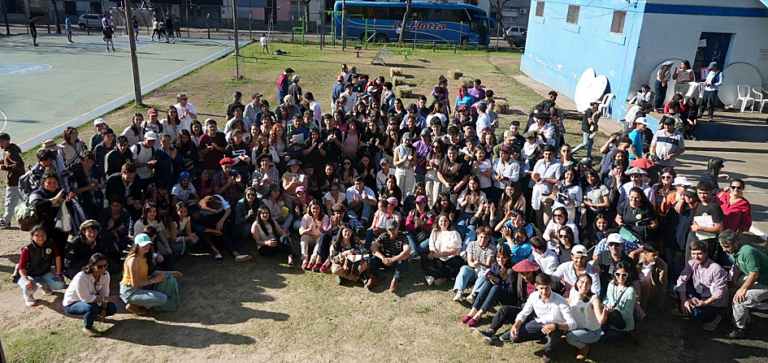Salto, Uruguay. More than 200 rural youth from all over the country gathered on September 28 in the city of Salto to participate in the 4th National Meeting of Rural Youth, an event designed to celebrate, make visible and strengthen the youth living in rural areas. The event, which took place at the Plaza de Deportes Nº1, was a unique opportunity to share experiences, generate dialogues and reflect on the living conditions of rural youth.
A space for visibility and recognition
Since its inception, the National Rural Youth Meeting has been a key space to give visibility to the needs, concerns and proposals of this sector. In this fourth edition, which took place in the northern coast of the country, rural youth were able to enjoy an intense day, full of exchange and recreational activities. Despite the suspension of the event scheduled for August 31, due to the proximity to the Rural Youth DayThe meeting finally took place in September, in an activity that exceeded expectations in terms of participation and energy.
This year, the meeting was organized by the Honorary Commission of Rural Youth (CHJR)a network of rural youth organizations, in partnership with the National Colonization Institute (INC), the Ministry of Livestock, Agriculture and Fisheries (MGAP) through the General Directorate of Rural Development (DGDR), and the Ministry of Social Development (MIDES), through the National Youth Institute (INJU). It also had the support of other local stakeholders such as the Departmental Agricultural Council, the REAF Youth Commission and the Salto Youth Group.
The day, which lasted from 9 a.m. to 6 p.m., had as its main protagonists young people between 14 and 29 years of age who live in rural areas or are linked to the agricultural sector. These young people, often forgotten in major public policy discussions, had the opportunity to make themselves heard and strengthen their rural identity.
Strengthening access to resources and training
The official opening of the meeting was attended by Mercedes Yacosa, director of the General Directorate of Rural Development, who stressed the importance of bringing young people closer to the means of production and training. "We want to reach out to young people so that they can have access to the means of production and training. We want rural youth to stay... but in order for them to stay, we have to provide them with opportunities, said Yacosa, highlighting the need to create conditions for young people to stay in the countryside and contribute to rural development.
In this regard, the director announced that the Directorate of Rural Development has implemented two lines of credit exclusively for rural youth. The first is a line of credit for study, while the second is oriented to productive projects. In addition, Yacosa informed that virtual financial education workshops will be offered to support young people in the management of their projects. The purpose of this measure is not only to support the training of young people, but also to foster their entrepreneurial capacity.
For its part, the National Colonization Institute (INC) mentioned new calls for young people, accompanied by technical advice and access to credits within the framework of the National Family Farming Plan (PNAF). These actions are fundamental to offer concrete tools to rural youths and thus guarantee their permanence in the countryside.
A day of dialogue, recreation and commitment
The day was not only limited to dialogue and reflection on public policies, but also included a series of fun and recreational activities. Participants were divided into thematic stations, where they were able to share their experiences and proposals on key issues such as education, access to land and rural employment. These collective exchange stations allowed the young people to express their opinions and establish more fluid communication between them and the authorities present.
In addition, the day was supported by recreationists, who organized recreational activities to relax the atmosphere and strengthen the bond between participants. As in every edition of the meeting, the day culminated with an artistic closing, which was a moment of celebration and cultural expression of rural youth.
According to the organizers, these types of meetings seek to "to make organized rural youth visible, as well as the public policies oriented to them"..



